普通法 案例分析笔记
常规法律案例分析(3篇)
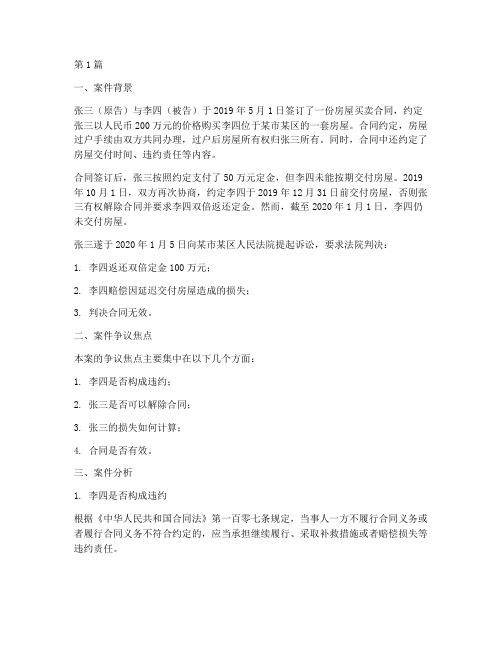
第1篇一、案件背景张三(原告)与李四(被告)于2019年5月1日签订了一份房屋买卖合同,约定张三以人民币200万元的价格购买李四位于某市某区的一套房屋。
合同约定,房屋过户手续由双方共同办理,过户后房屋所有权归张三所有。
同时,合同中还约定了房屋交付时间、违约责任等内容。
合同签订后,张三按照约定支付了50万元定金,但李四未能按期交付房屋。
2019年10月1日,双方再次协商,约定李四于2019年12月31日前交付房屋,否则张三有权解除合同并要求李四双倍返还定金。
然而,截至2020年1月1日,李四仍未交付房屋。
张三遂于2020年1月5日向某市某区人民法院提起诉讼,要求法院判决:1. 李四返还双倍定金100万元;2. 李四赔偿因延迟交付房屋造成的损失;3. 判决合同无效。
二、案件争议焦点本案的争议焦点主要集中在以下几个方面:1. 李四是否构成违约;2. 张三是否可以解除合同;3. 张三的损失如何计算;4. 合同是否有效。
三、案件分析1. 李四是否构成违约根据《中华人民共和国合同法》第一百零七条规定,当事人一方不履行合同义务或者履行合同义务不符合约定的,应当承担继续履行、采取补救措施或者赔偿损失等违约责任。
在本案中,李四未能按照合同约定的时间交付房屋,已构成违约。
因此,法院应认定李四违约。
2. 张三是否可以解除合同根据《中华人民共和国合同法》第一百零九条规定,当事人一方明确表示或者以自己的行为表明不履行合同义务的,对方可以在履行期限届满之前要求其承担违约责任。
在本案中,李四未能按期交付房屋,且在协商过程中未能履行交付义务,已经构成严重违约。
根据合同约定,张三有权解除合同。
因此,法院应支持张三解除合同的请求。
3. 张三的损失如何计算根据《中华人民共和国合同法》第一百一十四条规定,当事人一方不履行合同义务或者履行合同义务不符合约定的,造成对方损失的,应当赔偿损失。
在本案中,张三因李四未能按期交付房屋,导致其无法入住和使用房屋,造成了一定的经济损失。
法律案例及案例分析笔记(3篇)
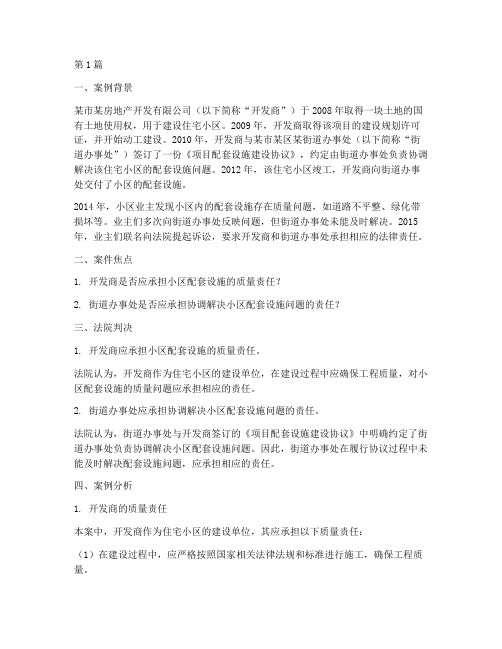
第1篇一、案例背景某市某房地产开发有限公司(以下简称“开发商”)于2008年取得一块土地的国有土地使用权,用于建设住宅小区。
2009年,开发商取得该项目的建设规划许可证,并开始动工建设。
2010年,开发商与某市某区某街道办事处(以下简称“街道办事处”)签订了一份《项目配套设施建设协议》,约定由街道办事处负责协调解决该住宅小区的配套设施问题。
2012年,该住宅小区竣工,开发商向街道办事处交付了小区的配套设施。
2014年,小区业主发现小区内的配套设施存在质量问题,如道路不平整、绿化带损坏等。
业主们多次向街道办事处反映问题,但街道办事处未能及时解决。
2015年,业主们联名向法院提起诉讼,要求开发商和街道办事处承担相应的法律责任。
二、案件焦点1. 开发商是否应承担小区配套设施的质量责任?2. 街道办事处是否应承担协调解决小区配套设施问题的责任?三、法院判决1. 开发商应承担小区配套设施的质量责任。
法院认为,开发商作为住宅小区的建设单位,在建设过程中应确保工程质量,对小区配套设施的质量问题应承担相应的责任。
2. 街道办事处应承担协调解决小区配套设施问题的责任。
法院认为,街道办事处与开发商签订的《项目配套设施建设协议》中明确约定了街道办事处负责协调解决小区配套设施问题。
因此,街道办事处在履行协议过程中未能及时解决配套设施问题,应承担相应的责任。
四、案例分析1. 开发商的质量责任本案中,开发商作为住宅小区的建设单位,其应承担以下质量责任:(1)在建设过程中,应严格按照国家相关法律法规和标准进行施工,确保工程质量。
(2)对已交付的配套设施,应承担维修、保养等责任,确保配套设施的正常使用。
(3)在业主发现配套设施存在问题后,应积极配合业主解决问题,及时采取措施进行修复。
2. 街道办事处的协调责任本案中,街道办事处与开发商签订的《项目配套设施建设协议》明确约定了街道办事处负责协调解决小区配套设施问题。
因此,街道办事处在履行协议过程中应承担以下责任:(1)及时了解业主对配套设施的需求,协调相关部门解决问题。
关于一般法律案例的分析(3篇)
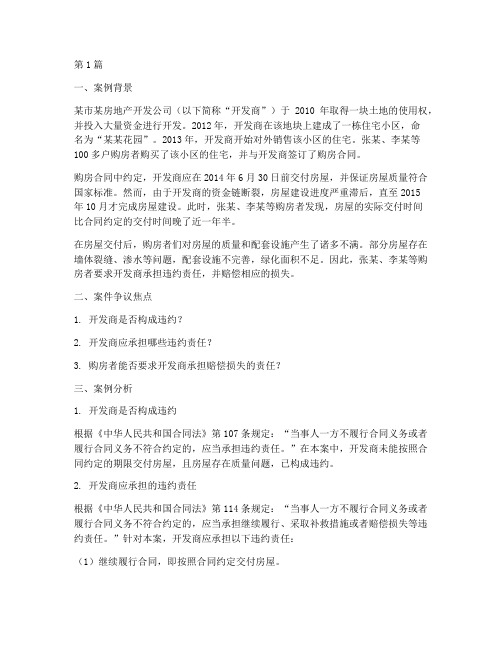
第1篇一、案例背景某市某房地产开发公司(以下简称“开发商”)于2010年取得一块土地的使用权,并投入大量资金进行开发。
2012年,开发商在该地块上建成了一栋住宅小区,命名为“某某花园”。
2013年,开发商开始对外销售该小区的住宅。
张某、李某等100多户购房者购买了该小区的住宅,并与开发商签订了购房合同。
购房合同中约定,开发商应在2014年6月30日前交付房屋,并保证房屋质量符合国家标准。
然而,由于开发商的资金链断裂,房屋建设进度严重滞后,直至2015年10月才完成房屋建设。
此时,张某、李某等购房者发现,房屋的实际交付时间比合同约定的交付时间晚了近一年半。
在房屋交付后,购房者们对房屋的质量和配套设施产生了诸多不满。
部分房屋存在墙体裂缝、渗水等问题,配套设施不完善,绿化面积不足。
因此,张某、李某等购房者要求开发商承担违约责任,并赔偿相应的损失。
二、案件争议焦点1. 开发商是否构成违约?2. 开发商应承担哪些违约责任?3. 购房者能否要求开发商承担赔偿损失的责任?三、案例分析1. 开发商是否构成违约根据《中华人民共和国合同法》第107条规定:“当事人一方不履行合同义务或者履行合同义务不符合约定的,应当承担违约责任。
”在本案中,开发商未能按照合同约定的期限交付房屋,且房屋存在质量问题,已构成违约。
2. 开发商应承担的违约责任根据《中华人民共和国合同法》第114条规定:“当事人一方不履行合同义务或者履行合同义务不符合约定的,应当承担继续履行、采取补救措施或者赔偿损失等违约责任。
”针对本案,开发商应承担以下违约责任:(1)继续履行合同,即按照合同约定交付房屋。
(2)采取补救措施,即修复房屋存在的质量问题。
(3)赔偿损失,包括:①因延期交付房屋给购房者造成的利息损失;②因房屋质量问题给购房者造成的经济损失;③因配套设施不完善给购房者造成的损失。
3. 购房者能否要求开发商承担赔偿损失的责任根据《中华人民共和国合同法》第113条规定:“当事人一方不履行合同义务或者履行合同义务不符合约定的,给对方造成损失的,损失赔偿额应当相当于因违约所造成的损失,包括合同履行后可以获得的利益,但不得超过违反合同一方订立合同时预见到或者应当预见到的因违反合同可能造成的损失。
法律案例笔记(3篇)
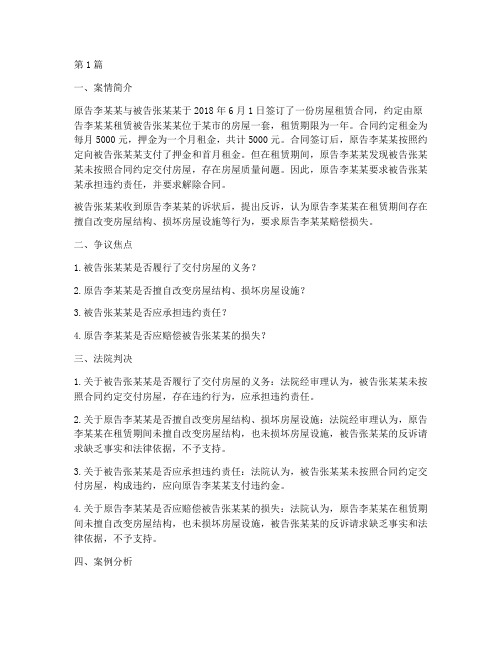
第1篇一、案情简介原告李某某与被告张某某于2018年6月1日签订了一份房屋租赁合同,约定由原告李某某租赁被告张某某位于某市的房屋一套,租赁期限为一年。
合同约定租金为每月5000元,押金为一个月租金,共计5000元。
合同签订后,原告李某某按照约定向被告张某某支付了押金和首月租金。
但在租赁期间,原告李某某发现被告张某某未按照合同约定交付房屋,存在房屋质量问题。
因此,原告李某某要求被告张某某承担违约责任,并要求解除合同。
被告张某某收到原告李某某的诉状后,提出反诉,认为原告李某某在租赁期间存在擅自改变房屋结构、损坏房屋设施等行为,要求原告李某某赔偿损失。
二、争议焦点1.被告张某某是否履行了交付房屋的义务?2.原告李某某是否擅自改变房屋结构、损坏房屋设施?3.被告张某某是否应承担违约责任?4.原告李某某是否应赔偿被告张某某的损失?三、法院判决1.关于被告张某某是否履行了交付房屋的义务:法院经审理认为,被告张某某未按照合同约定交付房屋,存在违约行为,应承担违约责任。
2.关于原告李某某是否擅自改变房屋结构、损坏房屋设施:法院经审理认为,原告李某某在租赁期间未擅自改变房屋结构,也未损坏房屋设施,被告张某某的反诉请求缺乏事实和法律依据,不予支持。
3.关于被告张某某是否应承担违约责任:法院认为,被告张某某未按照合同约定交付房屋,构成违约,应向原告李某某支付违约金。
4.关于原告李某某是否应赔偿被告张某某的损失:法院认为,原告李某某在租赁期间未擅自改变房屋结构,也未损坏房屋设施,被告张某某的反诉请求缺乏事实和法律依据,不予支持。
四、案例分析本案是一起典型的房屋租赁合同纠纷案件。
在审理过程中,法院主要围绕以下几个争议焦点进行审理:1.被告张某某是否履行了交付房屋的义务:根据《中华人民共和国合同法》第一百零一条规定,出卖人应当按照约定的地点交付标的物。
被告张某某未按照合同约定交付房屋,构成违约。
2.原告李某某是否擅自改变房屋结构、损坏房屋设施:根据《中华人民共和国合同法》第一百零四条第一款规定,承租人应当按照约定的方法使用租赁物。
经典法律案例分析总结(3篇)
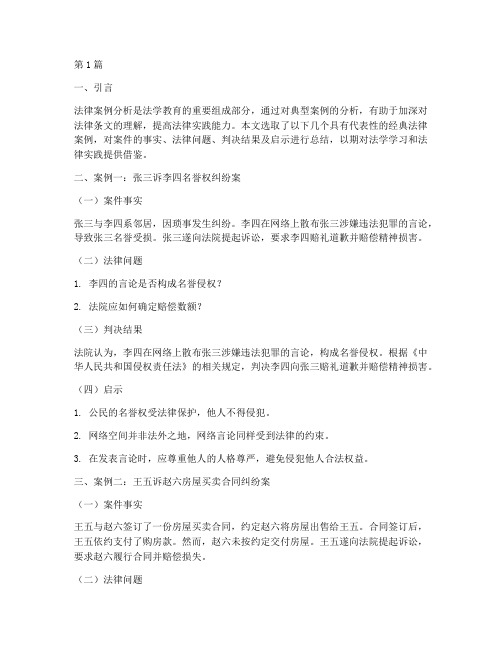
第1篇一、引言法律案例分析是法学教育的重要组成部分,通过对典型案例的分析,有助于加深对法律条文的理解,提高法律实践能力。
本文选取了以下几个具有代表性的经典法律案例,对案件的事实、法律问题、判决结果及启示进行总结,以期对法学学习和法律实践提供借鉴。
二、案例一:张三诉李四名誉权纠纷案(一)案件事实张三与李四系邻居,因琐事发生纠纷。
李四在网络上散布张三涉嫌违法犯罪的言论,导致张三名誉受损。
张三遂向法院提起诉讼,要求李四赔礼道歉并赔偿精神损害。
(二)法律问题1. 李四的言论是否构成名誉侵权?2. 法院应如何确定赔偿数额?(三)判决结果法院认为,李四在网络上散布张三涉嫌违法犯罪的言论,构成名誉侵权。
根据《中华人民共和国侵权责任法》的相关规定,判决李四向张三赔礼道歉并赔偿精神损害。
(四)启示1. 公民的名誉权受法律保护,他人不得侵犯。
2. 网络空间并非法外之地,网络言论同样受到法律的约束。
3. 在发表言论时,应尊重他人的人格尊严,避免侵犯他人合法权益。
三、案例二:王五诉赵六房屋买卖合同纠纷案(一)案件事实王五与赵六签订了一份房屋买卖合同,约定赵六将房屋出售给王五。
合同签订后,王五依约支付了购房款。
然而,赵六未按约定交付房屋。
王五遂向法院提起诉讼,要求赵六履行合同并赔偿损失。
(二)法律问题1. 房屋买卖合同是否有效?2. 赵六是否应承担违约责任?(三)判决结果法院认为,王五与赵六签订的房屋买卖合同有效。
根据《中华人民共和国合同法》的相关规定,判决赵六履行合同,向王五交付房屋,并赔偿王五因违约造成的损失。
(四)启示1. 合同是民事法律行为的基础,合同当事人应依法履行合同义务。
2. 违约方应承担违约责任,保护守约方的合法权益。
3. 在签订合同前,当事人应充分了解对方的资信状况,降低交易风险。
四、案例三:陈七诉周八知识产权侵权案(一)案件事实陈七创作了一首歌曲,并依法取得了著作权。
周八未经陈七许可,在其演唱会上演唱了这首歌曲。
法律案例摘抄笔记(3篇)

第1篇一、案例背景本案涉及一起合同纠纷,原告(甲公司)与被告(乙公司)签订了一份合作协议,约定甲公司向乙公司提供货物,乙公司支付相应货款。
然而,在履行合同过程中,双方因货款支付问题发生争议,甲公司遂向法院提起诉讼。
二、案件争议焦点1. 甲公司是否已履行了合同约定的义务。
2. 乙公司是否已按照合同约定支付了货款。
3. 双方是否存在违约行为,以及违约责任如何承担。
三、法院审理过程1. 原告主张:甲公司已按照合同约定提供了货物,乙公司未按期支付货款,构成违约。
2. 被告辩称:乙公司已支付部分货款,剩余货款因甲公司提供的货物存在质量问题,故拒绝支付。
3. 法院调查:法院依法调查了双方提供的证据,包括合同、货物验收报告、付款凭证等。
四、法院判决1. 关于甲公司履行义务的问题:法院认为,甲公司提供的货物与合同约定相符,已履行了合同约定的义务。
2. 关于乙公司支付货款的问题:法院认为,乙公司虽已支付部分货款,但仍有部分货款未支付,构成违约。
3. 关于违约责任承担的问题:法院认为,乙公司未按期支付货款,构成违约,应承担相应的违约责任。
鉴于甲公司提供的货物质量符合合同约定,乙公司无权以货物质量问题为由拒绝支付货款。
五、案例分析1. 合同履行原则:本案中,甲公司已按照合同约定提供了货物,履行了合同义务。
乙公司未按期支付货款,违反了合同约定。
2. 违约责任承担:根据《中华人民共和国合同法》第一百零七条规定,当事人一方不履行合同义务或者履行合同义务不符合约定的,应当承担继续履行、采取补救措施或者赔偿损失等违约责任。
本案中,乙公司未按期支付货款,应承担相应的违约责任。
3. 证据认定:本案中,法院依法调查了双方提供的证据,包括合同、货物验收报告、付款凭证等,确保了案件审理的公正性。
六、启示1. 合同当事人应严格按照合同约定履行义务,确保合同的顺利履行。
2. 在合同履行过程中,如发生争议,应及时协商解决,避免纠纷扩大。
3. 当事人应妥善保管证据,以便在发生争议时,能够依法维护自己的合法权益。
法律案例学习笔记(3篇)
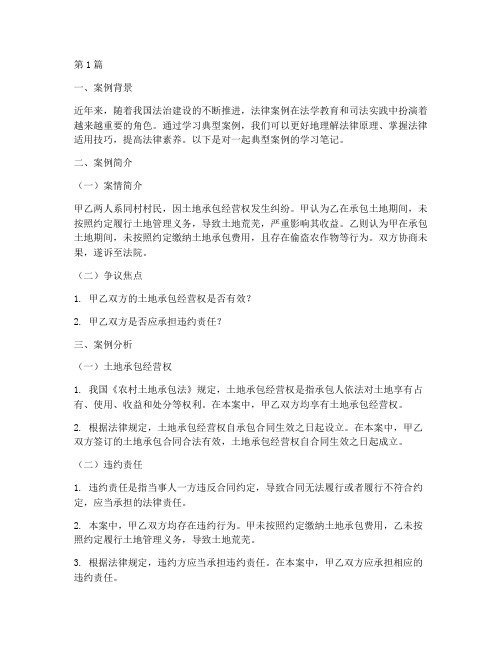
第1篇一、案例背景近年来,随着我国法治建设的不断推进,法律案例在法学教育和司法实践中扮演着越来越重要的角色。
通过学习典型案例,我们可以更好地理解法律原理、掌握法律适用技巧,提高法律素养。
以下是对一起典型案例的学习笔记。
二、案例简介(一)案情简介甲乙两人系同村村民,因土地承包经营权发生纠纷。
甲认为乙在承包土地期间,未按照约定履行土地管理义务,导致土地荒芜,严重影响其收益。
乙则认为甲在承包土地期间,未按照约定缴纳土地承包费用,且存在偷盗农作物等行为。
双方协商未果,遂诉至法院。
(二)争议焦点1. 甲乙双方的土地承包经营权是否有效?2. 甲乙双方是否应承担违约责任?三、案例分析(一)土地承包经营权1. 我国《农村土地承包法》规定,土地承包经营权是指承包人依法对土地享有占有、使用、收益和处分等权利。
在本案中,甲乙双方均享有土地承包经营权。
2. 根据法律规定,土地承包经营权自承包合同生效之日起设立。
在本案中,甲乙双方签订的土地承包合同合法有效,土地承包经营权自合同生效之日起成立。
(二)违约责任1. 违约责任是指当事人一方违反合同约定,导致合同无法履行或者履行不符合约定,应当承担的法律责任。
2. 本案中,甲乙双方均存在违约行为。
甲未按照约定缴纳土地承包费用,乙未按照约定履行土地管理义务,导致土地荒芜。
3. 根据法律规定,违约方应当承担违约责任。
在本案中,甲乙双方应承担相应的违约责任。
四、法律适用(一)适用《农村土地承包法》1. 本案涉及土地承包经营权,适用《农村土地承包法》的相关规定。
2. 根据《农村土地承包法》的规定,土地承包经营权人应当履行土地管理义务,保证土地的合理利用。
(二)适用《合同法》1. 本案涉及合同纠纷,适用《合同法》的相关规定。
2. 根据《合同法》的规定,当事人应当履行合同义务,保证合同目的的实现。
五、判决结果法院经审理认为,甲乙双方均存在违约行为,应承担相应的违约责任。
具体判决如下:1. 甲乙双方继续履行土地承包合同,甲应按照约定缴纳土地承包费用,乙应按照约定履行土地管理义务。
法律典型案例评析笔记(3篇)
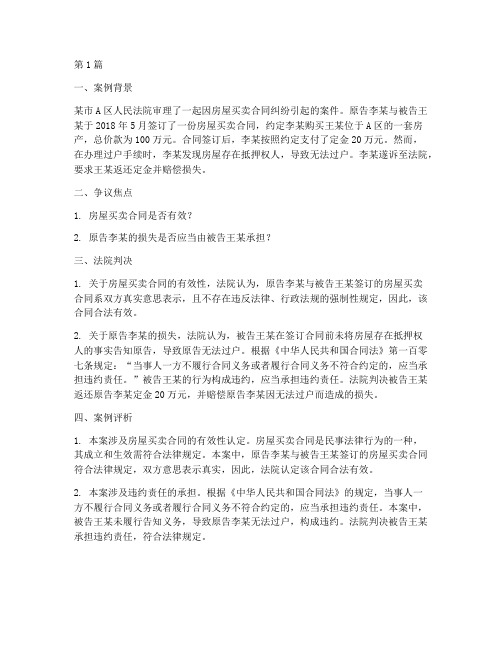
第1篇一、案例背景某市A区人民法院审理了一起因房屋买卖合同纠纷引起的案件。
原告李某与被告王某于2018年5月签订了一份房屋买卖合同,约定李某购买王某位于A区的一套房产,总价款为100万元。
合同签订后,李某按照约定支付了定金20万元。
然而,在办理过户手续时,李某发现房屋存在抵押权人,导致无法过户。
李某遂诉至法院,要求王某返还定金并赔偿损失。
二、争议焦点1. 房屋买卖合同是否有效?2. 原告李某的损失是否应当由被告王某承担?三、法院判决1. 关于房屋买卖合同的有效性,法院认为,原告李某与被告王某签订的房屋买卖合同系双方真实意思表示,且不存在违反法律、行政法规的强制性规定,因此,该合同合法有效。
2. 关于原告李某的损失,法院认为,被告王某在签订合同前未将房屋存在抵押权人的事实告知原告,导致原告无法过户。
根据《中华人民共和国合同法》第一百零七条规定:“当事人一方不履行合同义务或者履行合同义务不符合约定的,应当承担违约责任。
”被告王某的行为构成违约,应当承担违约责任。
法院判决被告王某返还原告李某定金20万元,并赔偿原告李某因无法过户而造成的损失。
四、案例评析1. 本案涉及房屋买卖合同的有效性认定。
房屋买卖合同是民事法律行为的一种,其成立和生效需符合法律规定。
本案中,原告李某与被告王某签订的房屋买卖合同符合法律规定,双方意思表示真实,因此,法院认定该合同合法有效。
2. 本案涉及违约责任的承担。
根据《中华人民共和国合同法》的规定,当事人一方不履行合同义务或者履行合同义务不符合约定的,应当承担违约责任。
本案中,被告王某未履行告知义务,导致原告李某无法过户,构成违约。
法院判决被告王某承担违约责任,符合法律规定。
3. 本案涉及定金返还问题。
根据《中华人民共和国担保法》的规定,当事人可以约定一方向对方给付定金作为债权的担保。
本案中,原告李某已按照约定支付了定金。
由于被告王某违约,法院判决被告王某返还定金,符合法律规定。
法律案例分析归纳总结(3篇)
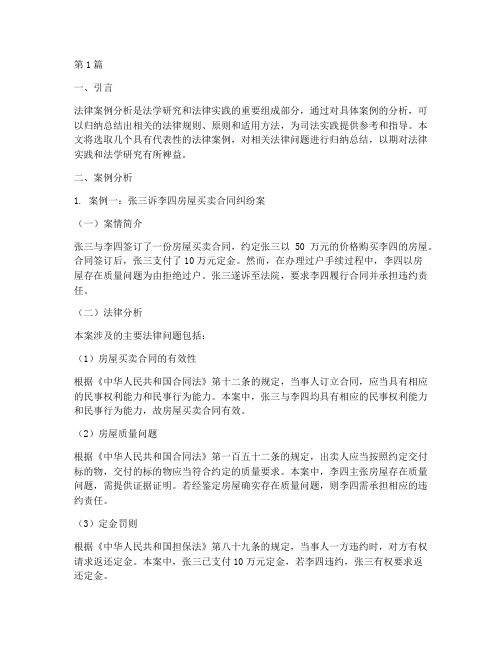
第1篇一、引言法律案例分析是法学研究和法律实践的重要组成部分,通过对具体案例的分析,可以归纳总结出相关的法律规则、原则和适用方法,为司法实践提供参考和指导。
本文将选取几个具有代表性的法律案例,对相关法律问题进行归纳总结,以期对法律实践和法学研究有所裨益。
二、案例分析1. 案例一:张三诉李四房屋买卖合同纠纷案(一)案情简介张三与李四签订了一份房屋买卖合同,约定张三以50万元的价格购买李四的房屋。
合同签订后,张三支付了10万元定金。
然而,在办理过户手续过程中,李四以房屋存在质量问题为由拒绝过户。
张三遂诉至法院,要求李四履行合同并承担违约责任。
(二)法律分析本案涉及的主要法律问题包括:(1)房屋买卖合同的有效性根据《中华人民共和国合同法》第十二条的规定,当事人订立合同,应当具有相应的民事权利能力和民事行为能力。
本案中,张三与李四均具有相应的民事权利能力和民事行为能力,故房屋买卖合同有效。
(2)房屋质量问题根据《中华人民共和国合同法》第一百五十二条的规定,出卖人应当按照约定交付标的物,交付的标的物应当符合约定的质量要求。
本案中,李四主张房屋存在质量问题,需提供证据证明。
若经鉴定房屋确实存在质量问题,则李四需承担相应的违约责任。
(3)定金罚则根据《中华人民共和国担保法》第八十九条的规定,当事人一方违约时,对方有权请求返还定金。
本案中,张三已支付10万元定金,若李四违约,张三有权要求返还定金。
(三)判决结果法院经审理认为,李四未能提供证据证明房屋存在质量问题,故判决李四履行合同,办理过户手续,并承担违约责任,退还张三定金。
2. 案例二:王五诉赵六侵权责任纠纷案(一)案情简介王五在公园散步时,被赵六饲养的狗咬伤。
王五遂诉至法院,要求赵六承担侵权责任,赔偿医疗费、精神损害抚慰金等费用。
(二)法律分析本案涉及的主要法律问题包括:(1)侵权责任的构成要件根据《中华人民共和国侵权责任法》第六条的规定,行为人因过错侵害他人民事权益,应当承担侵权责任。
法律案例及案例分析笔记(3篇)
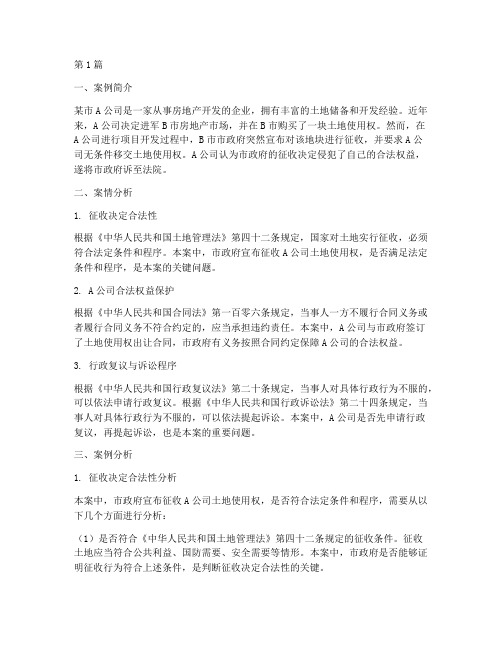
第1篇一、案例简介某市A公司是一家从事房地产开发的企业,拥有丰富的土地储备和开发经验。
近年来,A公司决定进军B市房地产市场,并在B市购买了一块土地使用权。
然而,在A公司进行项目开发过程中,B市市政府突然宣布对该地块进行征收,并要求A公司无条件移交土地使用权。
A公司认为市政府的征收决定侵犯了自己的合法权益,遂将市政府诉至法院。
二、案情分析1. 征收决定合法性根据《中华人民共和国土地管理法》第四十二条规定,国家对土地实行征收,必须符合法定条件和程序。
本案中,市政府宣布征收A公司土地使用权,是否满足法定条件和程序,是本案的关键问题。
2. A公司合法权益保护根据《中华人民共和国合同法》第一百零六条规定,当事人一方不履行合同义务或者履行合同义务不符合约定的,应当承担违约责任。
本案中,A公司与市政府签订了土地使用权出让合同,市政府有义务按照合同约定保障A公司的合法权益。
3. 行政复议与诉讼程序根据《中华人民共和国行政复议法》第二十条规定,当事人对具体行政行为不服的,可以依法申请行政复议。
根据《中华人民共和国行政诉讼法》第二十四条规定,当事人对具体行政行为不服的,可以依法提起诉讼。
本案中,A公司是否先申请行政复议,再提起诉讼,也是本案的重要问题。
三、案例分析1. 征收决定合法性分析本案中,市政府宣布征收A公司土地使用权,是否符合法定条件和程序,需要从以下几个方面进行分析:(1)是否符合《中华人民共和国土地管理法》第四十二条规定的征收条件。
征收土地应当符合公共利益、国防需要、安全需要等情形。
本案中,市政府是否能够证明征收行为符合上述条件,是判断征收决定合法性的关键。
(2)征收程序是否合法。
根据《中华人民共和国土地管理法》第四十三条规定,征收土地应当依法进行公告、调查、评估、补偿等程序。
本案中,市政府是否履行了上述程序,是判断征收决定合法性的关键。
2. A公司合法权益保护分析本案中,A公司与市政府签订了土地使用权出让合同,根据《中华人民共和国合同法》第一百零六条规定,市政府有义务按照合同约定保障A公司的合法权益。
法律案例听课笔记(3篇)
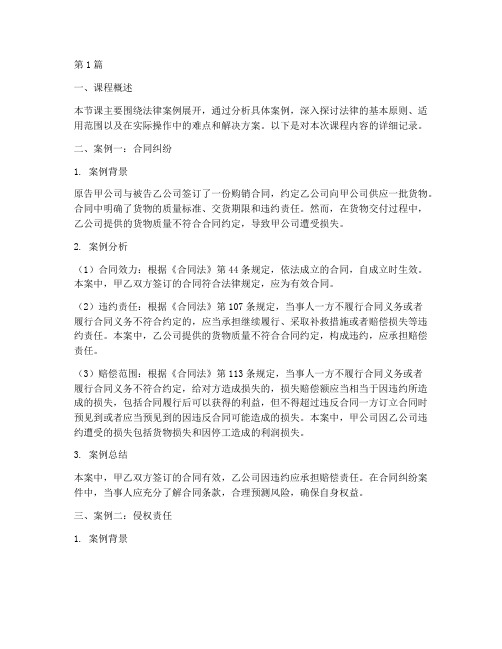
第1篇一、课程概述本节课主要围绕法律案例展开,通过分析具体案例,深入探讨法律的基本原则、适用范围以及在实际操作中的难点和解决方案。
以下是对本次课程内容的详细记录。
二、案例一:合同纠纷1. 案例背景原告甲公司与被告乙公司签订了一份购销合同,约定乙公司向甲公司供应一批货物。
合同中明确了货物的质量标准、交货期限和违约责任。
然而,在货物交付过程中,乙公司提供的货物质量不符合合同约定,导致甲公司遭受损失。
2. 案例分析(1)合同效力:根据《合同法》第44条规定,依法成立的合同,自成立时生效。
本案中,甲乙双方签订的合同符合法律规定,应为有效合同。
(2)违约责任:根据《合同法》第107条规定,当事人一方不履行合同义务或者履行合同义务不符合约定的,应当承担继续履行、采取补救措施或者赔偿损失等违约责任。
本案中,乙公司提供的货物质量不符合合同约定,构成违约,应承担赔偿责任。
(3)赔偿范围:根据《合同法》第113条规定,当事人一方不履行合同义务或者履行合同义务不符合约定,给对方造成损失的,损失赔偿额应当相当于因违约所造成的损失,包括合同履行后可以获得的利益,但不得超过违反合同一方订立合同时预见到或者应当预见到的因违反合同可能造成的损失。
本案中,甲公司因乙公司违约遭受的损失包括货物损失和因停工造成的利润损失。
3. 案例总结本案中,甲乙双方签订的合同有效,乙公司因违约应承担赔偿责任。
在合同纠纷案件中,当事人应充分了解合同条款,合理预测风险,确保自身权益。
三、案例二:侵权责任1. 案例背景原告乙公司在其产品包装上使用了与被告甲公司产品包装相似的图案,导致消费者误将乙公司产品误认为是甲公司产品。
甲公司认为乙公司侵犯了其商标权,遂提起诉讼。
2. 案例分析(1)商标侵权:根据《商标法》第57条规定,有下列行为之一的,均属侵犯注册商标专用权:……(三)未经商标注册人的许可,在同一种商品或者类似商品上使用与其注册商标相同或者近似的商标的。
法律典型案例分析笔记(3篇)
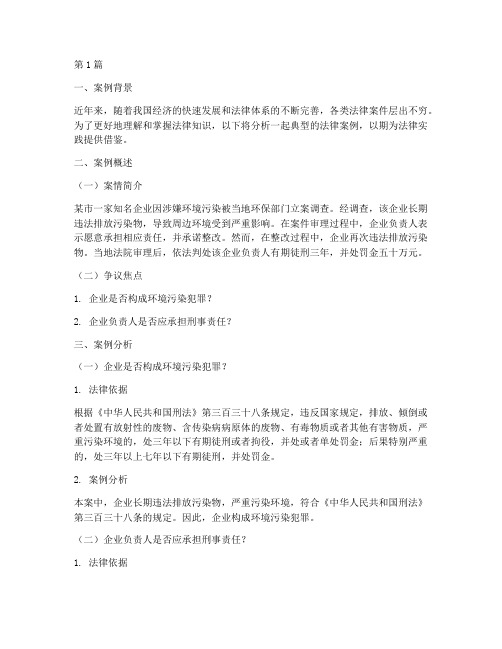
第1篇一、案例背景近年来,随着我国经济的快速发展和法律体系的不断完善,各类法律案件层出不穷。
为了更好地理解和掌握法律知识,以下将分析一起典型的法律案例,以期为法律实践提供借鉴。
二、案例概述(一)案情简介某市一家知名企业因涉嫌环境污染被当地环保部门立案调查。
经调查,该企业长期违法排放污染物,导致周边环境受到严重影响。
在案件审理过程中,企业负责人表示愿意承担相应责任,并承诺整改。
然而,在整改过程中,企业再次违法排放污染物。
当地法院审理后,依法判处该企业负责人有期徒刑三年,并处罚金五十万元。
(二)争议焦点1. 企业是否构成环境污染犯罪?2. 企业负责人是否应承担刑事责任?三、案例分析(一)企业是否构成环境污染犯罪?1. 法律依据根据《中华人民共和国刑法》第三百三十八条规定,违反国家规定,排放、倾倒或者处置有放射性的废物、含传染病病原体的废物、有毒物质或者其他有害物质,严重污染环境的,处三年以下有期徒刑或者拘役,并处或者单处罚金;后果特别严重的,处三年以上七年以下有期徒刑,并处罚金。
2. 案例分析本案中,企业长期违法排放污染物,严重污染环境,符合《中华人民共和国刑法》第三百三十八条的规定。
因此,企业构成环境污染犯罪。
(二)企业负责人是否应承担刑事责任?1. 法律依据根据《中华人民共和国刑法》第三百三十八条规定,单位犯罪的,对单位判处罚金,并对其直接负责的主管人员和其他直接责任人员,依照各该条的规定处罚。
2. 案例分析本案中,企业负责人作为企业直接负责的主管人员,对企业的违法行为负有直接责任。
根据《中华人民共和国刑法》第三百三十八条的规定,企业负责人应承担刑事责任。
四、案例启示1. 企业应严格遵守环保法律法规,切实履行环境保护责任。
2. 相关部门应加强对企业的监管,严厉打击环境污染违法行为。
3. 法律机关应依法审理环境污染案件,维护国家法律权威和社会公共利益。
4. 企业负责人应增强法律意识,自觉遵守法律法规,履行社会责任。
法律典型案例评析笔记(3篇)
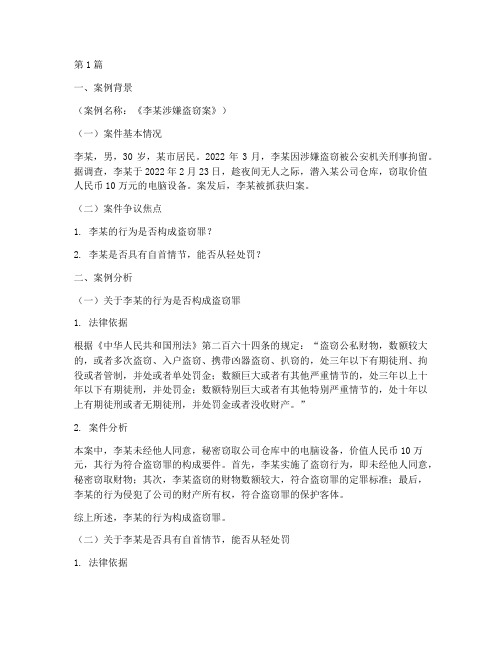
第1篇一、案例背景(案例名称:《李某涉嫌盗窃案》)(一)案件基本情况李某,男,30岁,某市居民。
2022年3月,李某因涉嫌盗窃被公安机关刑事拘留。
据调查,李某于2022年2月23日,趁夜间无人之际,潜入某公司仓库,窃取价值人民币10万元的电脑设备。
案发后,李某被抓获归案。
(二)案件争议焦点1. 李某的行为是否构成盗窃罪?2. 李某是否具有自首情节,能否从轻处罚?二、案例分析(一)关于李某的行为是否构成盗窃罪1. 法律依据根据《中华人民共和国刑法》第二百六十四条的规定:“盗窃公私财物,数额较大的,或者多次盗窃、入户盗窃、携带凶器盗窃、扒窃的,处三年以下有期徒刑、拘役或者管制,并处或者单处罚金;数额巨大或者有其他严重情节的,处三年以上十年以下有期徒刑,并处罚金;数额特别巨大或者有其他特别严重情节的,处十年以上有期徒刑或者无期徒刑,并处罚金或者没收财产。
”2. 案件分析本案中,李某未经他人同意,秘密窃取公司仓库中的电脑设备,价值人民币10万元,其行为符合盗窃罪的构成要件。
首先,李某实施了盗窃行为,即未经他人同意,秘密窃取财物;其次,李某盗窃的财物数额较大,符合盗窃罪的定罪标准;最后,李某的行为侵犯了公司的财产所有权,符合盗窃罪的保护客体。
综上所述,李某的行为构成盗窃罪。
(二)关于李某是否具有自首情节,能否从轻处罚1. 法律依据根据《中华人民共和国刑法》第六十七条的规定:“犯罪以后自动投案,如实供述自己的罪行的,是自首。
对于自首的犯罪分子,可以从轻或者减轻处罚;其中,犯罪较轻的,可以免除处罚。
”2. 案件分析本案中,李某在被公安机关抓获后,如实供述了自己的犯罪事实,符合自首的构成要件。
首先,李某在案发后主动投案,没有逃避侦查;其次,李某如实供述了自己的犯罪行为,没有隐瞒事实;最后,李某的行为符合自首的时间、地点、方式和内容要求。
因此,李某具有自首情节,可以从轻处罚。
三、判决结果根据以上分析,法院依法判决李某犯盗窃罪,判处有期徒刑三年,并处罚金人民币五万元。
普通法律案件分析(3篇)
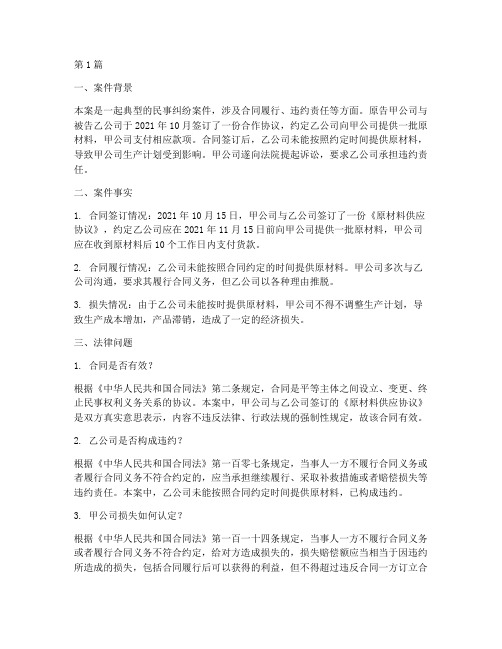
第1篇一、案件背景本案是一起典型的民事纠纷案件,涉及合同履行、违约责任等方面。
原告甲公司与被告乙公司于2021年10月签订了一份合作协议,约定乙公司向甲公司提供一批原材料,甲公司支付相应款项。
合同签订后,乙公司未能按照约定时间提供原材料,导致甲公司生产计划受到影响。
甲公司遂向法院提起诉讼,要求乙公司承担违约责任。
二、案件事实1. 合同签订情况:2021年10月15日,甲公司与乙公司签订了一份《原材料供应协议》,约定乙公司应在2021年11月15日前向甲公司提供一批原材料,甲公司应在收到原材料后10个工作日内支付货款。
2. 合同履行情况:乙公司未能按照合同约定的时间提供原材料。
甲公司多次与乙公司沟通,要求其履行合同义务,但乙公司以各种理由推脱。
3. 损失情况:由于乙公司未能按时提供原材料,甲公司不得不调整生产计划,导致生产成本增加,产品滞销,造成了一定的经济损失。
三、法律问题1. 合同是否有效?根据《中华人民共和国合同法》第二条规定,合同是平等主体之间设立、变更、终止民事权利义务关系的协议。
本案中,甲公司与乙公司签订的《原材料供应协议》是双方真实意思表示,内容不违反法律、行政法规的强制性规定,故该合同有效。
2. 乙公司是否构成违约?根据《中华人民共和国合同法》第一百零七条规定,当事人一方不履行合同义务或者履行合同义务不符合约定的,应当承担继续履行、采取补救措施或者赔偿损失等违约责任。
本案中,乙公司未能按照合同约定时间提供原材料,已构成违约。
3. 甲公司损失如何认定?根据《中华人民共和国合同法》第一百一十四条规定,当事人一方不履行合同义务或者履行合同义务不符合约定,给对方造成损失的,损失赔偿额应当相当于因违约所造成的损失,包括合同履行后可以获得的利益,但不得超过违反合同一方订立合同时预见到或者应当预见到的因违反合同可能造成的损失。
本案中,甲公司因乙公司违约而遭受的损失包括生产成本增加、产品滞销等,应依法予以赔偿。
一般法律的案例分析(3篇)
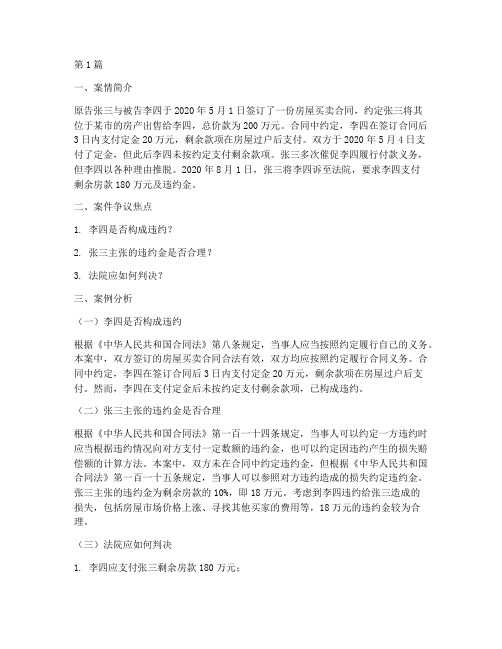
第1篇一、案情简介原告张三与被告李四于2020年5月1日签订了一份房屋买卖合同,约定张三将其位于某市的房产出售给李四,总价款为200万元。
合同中约定,李四在签订合同后3日内支付定金20万元,剩余款项在房屋过户后支付。
双方于2020年5月4日支付了定金,但此后李四未按约定支付剩余款项。
张三多次催促李四履行付款义务,但李四以各种理由推脱。
2020年8月1日,张三将李四诉至法院,要求李四支付剩余房款180万元及违约金。
二、案件争议焦点1. 李四是否构成违约?2. 张三主张的违约金是否合理?3. 法院应如何判决?三、案例分析(一)李四是否构成违约根据《中华人民共和国合同法》第八条规定,当事人应当按照约定履行自己的义务。
本案中,双方签订的房屋买卖合同合法有效,双方均应按照约定履行合同义务。
合同中约定,李四在签订合同后3日内支付定金20万元,剩余款项在房屋过户后支付。
然而,李四在支付定金后未按约定支付剩余款项,已构成违约。
(二)张三主张的违约金是否合理根据《中华人民共和国合同法》第一百一十四条规定,当事人可以约定一方违约时应当根据违约情况向对方支付一定数额的违约金,也可以约定因违约产生的损失赔偿额的计算方法。
本案中,双方未在合同中约定违约金,但根据《中华人民共和国合同法》第一百一十五条规定,当事人可以参照对方违约造成的损失约定违约金。
张三主张的违约金为剩余房款的10%,即18万元。
考虑到李四违约给张三造成的损失,包括房屋市场价格上涨、寻找其他买家的费用等,18万元的违约金较为合理。
(三)法院应如何判决1. 李四应支付张三剩余房款180万元;2. 李四应支付张三违约金18万元;3. 双方无其他纠纷。
四、判决结果法院经审理认为,李四在签订合同后未按约定支付剩余房款,已构成违约。
根据《中华人民共和国合同法》的规定,判决如下:1. 被告李四应支付原告张三剩余房款180万元;2. 被告李四应支付原告张三违约金18万元;3. 双方无其他纠纷。
一般法律的案例分析(3篇)
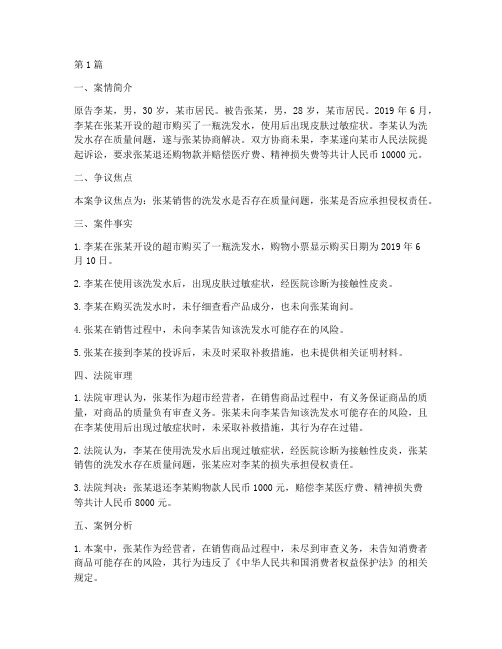
第1篇一、案情简介原告李某,男,30岁,某市居民。
被告张某,男,28岁,某市居民。
2019年6月,李某在张某开设的超市购买了一瓶洗发水,使用后出现皮肤过敏症状。
李某认为洗发水存在质量问题,遂与张某协商解决。
双方协商未果,李某遂向某市人民法院提起诉讼,要求张某退还购物款并赔偿医疗费、精神损失费等共计人民币10000元。
二、争议焦点本案争议焦点为:张某销售的洗发水是否存在质量问题,张某是否应承担侵权责任。
三、案件事实1.李某在张某开设的超市购买了一瓶洗发水,购物小票显示购买日期为2019年6月10日。
2.李某在使用该洗发水后,出现皮肤过敏症状,经医院诊断为接触性皮炎。
3.李某在购买洗发水时,未仔细查看产品成分,也未向张某询问。
4.张某在销售过程中,未向李某告知该洗发水可能存在的风险。
5.张某在接到李某的投诉后,未及时采取补救措施,也未提供相关证明材料。
四、法院审理1.法院审理认为,张某作为超市经营者,在销售商品过程中,有义务保证商品的质量,对商品的质量负有审查义务。
张某未向李某告知该洗发水可能存在的风险,且在李某使用后出现过敏症状时,未采取补救措施,其行为存在过错。
2.法院认为,李某在使用洗发水后出现过敏症状,经医院诊断为接触性皮炎,张某销售的洗发水存在质量问题,张某应对李某的损失承担侵权责任。
3.法院判决:张某退还李某购物款人民币1000元,赔偿李某医疗费、精神损失费等共计人民币8000元。
五、案例分析1.本案中,张某作为经营者,在销售商品过程中,未尽到审查义务,未告知消费者商品可能存在的风险,其行为违反了《中华人民共和国消费者权益保护法》的相关规定。
2.根据《中华人民共和国侵权责任法》的规定,张某因销售存在质量问题的商品,给李某造成损害,应当承担侵权责任。
3.本案中,李某在购买商品时,未尽到合理注意义务,未仔细查看商品成分,也未向经营者询问,存在一定过错。
但张某作为经营者,其过错更为明显,因此,法院未减轻张某的赔偿责任。
法律案例分析记录内容(3篇)
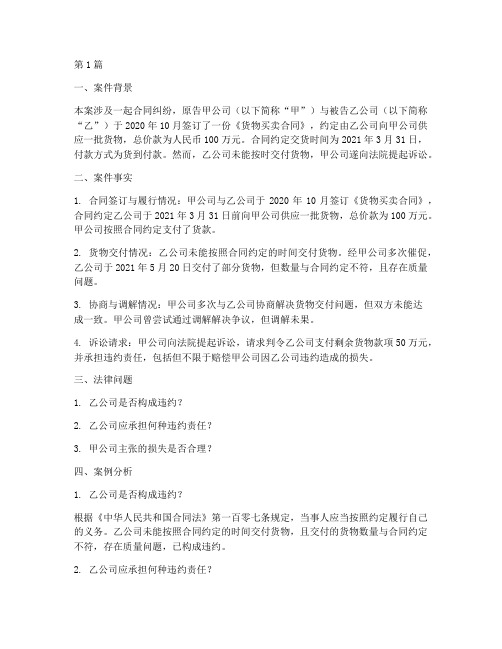
第1篇一、案件背景本案涉及一起合同纠纷,原告甲公司(以下简称“甲”)与被告乙公司(以下简称“乙”)于2020年10月签订了一份《货物买卖合同》,约定由乙公司向甲公司供应一批货物,总价款为人民币100万元。
合同约定交货时间为2021年3月31日,付款方式为货到付款。
然而,乙公司未能按时交付货物,甲公司遂向法院提起诉讼。
二、案件事实1. 合同签订与履行情况:甲公司与乙公司于2020年10月签订《货物买卖合同》,合同约定乙公司于2021年3月31日前向甲公司供应一批货物,总价款为100万元。
甲公司按照合同约定支付了货款。
2. 货物交付情况:乙公司未能按照合同约定的时间交付货物。
经甲公司多次催促,乙公司于2021年5月20日交付了部分货物,但数量与合同约定不符,且存在质量问题。
3. 协商与调解情况:甲公司多次与乙公司协商解决货物交付问题,但双方未能达成一致。
甲公司曾尝试通过调解解决争议,但调解未果。
4. 诉讼请求:甲公司向法院提起诉讼,请求判令乙公司支付剩余货物款项50万元,并承担违约责任,包括但不限于赔偿甲公司因乙公司违约造成的损失。
三、法律问题1. 乙公司是否构成违约?2. 乙公司应承担何种违约责任?3. 甲公司主张的损失是否合理?四、案例分析1. 乙公司是否构成违约?根据《中华人民共和国合同法》第一百零七条规定,当事人应当按照约定履行自己的义务。
乙公司未能按照合同约定的时间交付货物,且交付的货物数量与合同约定不符,存在质量问题,已构成违约。
2. 乙公司应承担何种违约责任?根据《中华人民共和国合同法》第一百一十四条规定,当事人一方不履行合同义务或者履行合同义务不符合约定的,应当承担继续履行、采取补救措施或者赔偿损失等违约责任。
鉴于乙公司已构成违约,甲公司有权要求乙公司继续履行合同,交付剩余货物,并赔偿因乙公司违约造成的损失。
3. 甲公司主张的损失是否合理?甲公司主张的损失包括因乙公司违约造成的货物价格下跌、市场机会损失等。
关于一般法律案例的分析(3篇)
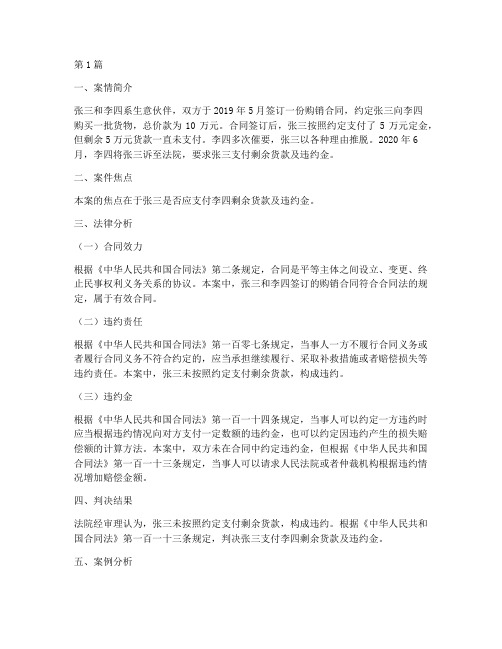
第1篇一、案情简介张三和李四系生意伙伴,双方于2019年5月签订一份购销合同,约定张三向李四购买一批货物,总价款为10万元。
合同签订后,张三按照约定支付了5万元定金,但剩余5万元货款一直未支付。
李四多次催要,张三以各种理由推脱。
2020年6月,李四将张三诉至法院,要求张三支付剩余货款及违约金。
二、案件焦点本案的焦点在于张三是否应支付李四剩余货款及违约金。
三、法律分析(一)合同效力根据《中华人民共和国合同法》第二条规定,合同是平等主体之间设立、变更、终止民事权利义务关系的协议。
本案中,张三和李四签订的购销合同符合合同法的规定,属于有效合同。
(二)违约责任根据《中华人民共和国合同法》第一百零七条规定,当事人一方不履行合同义务或者履行合同义务不符合约定的,应当承担继续履行、采取补救措施或者赔偿损失等违约责任。
本案中,张三未按照约定支付剩余货款,构成违约。
(三)违约金根据《中华人民共和国合同法》第一百一十四条规定,当事人可以约定一方违约时应当根据违约情况向对方支付一定数额的违约金,也可以约定因违约产生的损失赔偿额的计算方法。
本案中,双方未在合同中约定违约金,但根据《中华人民共和国合同法》第一百一十三条规定,当事人可以请求人民法院或者仲裁机构根据违约情况增加赔偿金额。
四、判决结果法院经审理认为,张三未按照约定支付剩余货款,构成违约。
根据《中华人民共和国合同法》第一百一十三条规定,判决张三支付李四剩余货款及违约金。
五、案例分析本案涉及合同效力、违约责任和违约金等方面。
以下是对本案的详细分析:1. 合同效力:本案中,张三和李四签订的购销合同符合合同法的规定,属于有效合同。
双方在签订合同时,应当遵守合同约定,履行合同义务。
2. 违约责任:张三未按照约定支付剩余货款,构成违约。
根据合同法的规定,张三应当承担违约责任,向李四支付剩余货款及违约金。
3. 违约金:本案中,双方未在合同中约定违约金,但根据合同法的规定,李四可以请求人民法院或者仲裁机构根据违约情况增加赔偿金额。
一般法律案例分析(3篇)
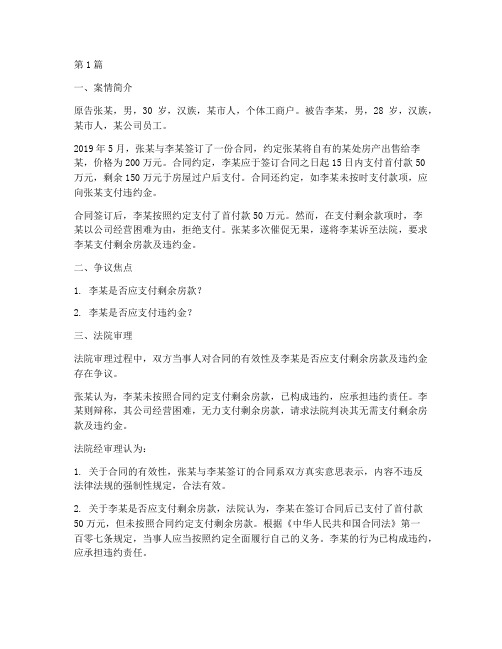
第1篇一、案情简介原告张某,男,30岁,汉族,某市人,个体工商户。
被告李某,男,28岁,汉族,某市人,某公司员工。
2019年5月,张某与李某签订了一份合同,约定张某将自有的某处房产出售给李某,价格为200万元。
合同约定,李某应于签订合同之日起15日内支付首付款50万元,剩余150万元于房屋过户后支付。
合同还约定,如李某未按时支付款项,应向张某支付违约金。
合同签订后,李某按照约定支付了首付款50万元。
然而,在支付剩余款项时,李某以公司经营困难为由,拒绝支付。
张某多次催促无果,遂将李某诉至法院,要求李某支付剩余房款及违约金。
二、争议焦点1. 李某是否应支付剩余房款?2. 李某是否应支付违约金?三、法院审理法院审理过程中,双方当事人对合同的有效性及李某是否应支付剩余房款及违约金存在争议。
张某认为,李某未按照合同约定支付剩余房款,已构成违约,应承担违约责任。
李某则辩称,其公司经营困难,无力支付剩余房款,请求法院判决其无需支付剩余房款及违约金。
法院经审理认为:1. 关于合同的有效性,张某与李某签订的合同系双方真实意思表示,内容不违反法律法规的强制性规定,合法有效。
2. 关于李某是否应支付剩余房款,法院认为,李某在签订合同后已支付了首付款50万元,但未按照合同约定支付剩余房款。
根据《中华人民共和国合同法》第一百零七条规定,当事人应当按照约定全面履行自己的义务。
李某的行为已构成违约,应承担违约责任。
3. 关于李某是否应支付违约金,法院认为,合同中约定的违约金条款合法有效,李某未按照约定履行合同义务,应按照合同约定支付违约金。
四、判决结果法院判决李某支付张某剩余房款150万元及违约金。
李某不服一审判决,上诉至中级人民法院。
中级人民法院经审理,驳回上诉,维持原判。
五、案例分析本案是一起典型的合同纠纷案,涉及合同履行、违约责任等问题。
1. 合同履行:张某与李某签订的合同合法有效,双方当事人应按照约定履行合同义务。
李某未按照约定支付剩余房款,已构成违约。
普通法 案例分析笔记
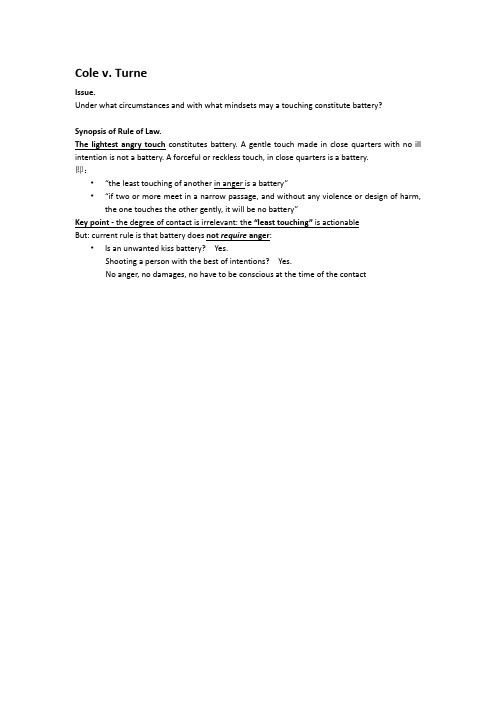
Cole v. TurneIssue.Under what circumstances and with what mindsets may a touching constitute battery?Synopsis of Rule of Law.The lightest angry touch constitutes battery. A gentle touch made in close quarters with no ill intention is not a battery. A forceful or reckless touch, in close quarters is a battery.即:•“the least touching of another in anger is a battery”•“if two or more meet in a narrow pas sage, and without any violence or design of harm, the one touches the other gently, it will be no battery”Key point - the degree of contact is irrelevant: the“least touching” is actionableBut: current rule is that battery does not require anger:•Is an unwanted kiss battery? Yes.Shooting a person with the best of intentions? Yes.No anger, no damages, no have to be conscious at the time of the contactCollins v Wilcock [1984] 3 All ER 374FACT:A police woman took hold of a woman's arm to stop her walking off when she was questioning her. The woman scratched the police woman and was charged with assaulting a police officer in the course of her duty.Me:thedefendant refused to answer police woman’s question and walked away when police woman persisted to follow herand took hold of her arm to restrain her. The defendant swore at and scratched the officer’s arm, As a result, the D was arrested and charged with assaulting a police officer in the course of her duty.Issue:whether officer can physically hold suspect without arrest?(P3)Holding:officer’ action is unlawful and amounted to a battery since it went beyond the generally acceotable conduct of touching a person to engage his attention. The defendant's action was therefore in self defence and D’s conviction was quashed(撤销).Rule: unless there is an arrest, officer cannot use physical force to hold a suspect, and such force may constitute tort of batterySidaway v. Bethlem Royal Hospital Governors (1985 HLs)Facts:Claimant suffered persistent pain in her neck, right shoulder, and arms.Claimant consented to the neurosurgeon’s recommended treatment of cervical cord decompression. Doctor did tell her even if the operation properly performed, risk of disturbing a nerve root/consequences. But doctor not explain the fact that in less than 1% of the cases, the decompression treatment caused spinal cord damage, paraplegia. Doctor also not informed the plaintiff that this was an op eration of choice or "elective operation“ (she didn’t need to have it) Plaintiff patient developed paraplegia after the spinal operationCasebook:MrsSiddeway suffered persisitent pain in her right arm and shoulder and a surgeon employed by the defendants recommended an operation to her spine to which Mrssidawat consented. The operation involved a risk,put at least 1%, of damage to the spine and MrsSidawat was not informed of the risk ,The operation was properly conducted but unfortunately the risk materialized and the clainmanr became severely disabled.She sue the defendants on the groud that surgeon had failed to inform her of riskHeld:dismissing the appeal ,that the defendant were not liable.Rule and notable points of law:Unlike US law, in English law consent not vitiated by the failure of the doctor to give the patient sufficient information before the consent is givenOnly if the consent is obtained by fraud or by misrepresentation it could be said that consent is not a true consent, allow batteryPatient’s consent must still be real: to be real patient should be told enough about the treatment to understand what will be done to themCasebook: at the same time the doctor is not entitled to make the final decision with regard to treatment which may have disadvantages or dangers , where the patient’s heath and future are stake ,the patient must make the final decision. Thus, the right to make the final decision and the duty of the doctor to inform the patient if the treatment may have the special disadvantages or dangers go hand in hand.●infliction of bodily restraint, which is not expressly or impliedly authorized by the law●Any restraint of liberty, and can occur anywhere (not just a prison)●R estraint must be completeBird v. Jones, 7 Ad. & El. (N.S.) 742, 115 Eng. Rep. 688 (1845).Case Summary为了演出而限制人流—原告强行进去—不让原告进入,但允许原告撤退—不构成非法拘禁Facts: part of Hammersmith Bridge, ordinarily used as a public footway, had been closed for spectators of a boat race. Bird (P) wanted to enter but he was prevented by Jones (D) and other policemen because he had not paid the admission fee.Defendants refused to let him go forward but would allow him to retrace his steps. P refused to leaveand was in the enclosure for half hour. Bird sued Jones for false imprisonment.Issue: Can a party be liable for false imprisonment if he only partially restricts the movement of another such that a way out is available?Holding and Rule: No. P could have left but chose not to. D did not totally restrict his movements. D merely did not allow P to go where he wanted to go.Rule and notable points of law:Did not constitute false imprisonment as the plaintiff could have left the area another way Merely obstructing someone’s way is not false imprisonment if the plaintiff has another means of going out (egress)When a person is restrained, there need not be actual physical restraint,e g:an arrest,even if executed by merely touching the claimant,is a restraint as it would be if a person has the physical capatity to leave but it is unreasonable to expect him to do so.McFadzean v. Construction Forestry Mining and Energy Union (2007 Australia, Supreme Court of Victoria – Court of Appeal)Fact:见PPT 75Rule:Four criteria to determine whether egress is reasonable: threat or danger to self/property (e.g., jumping out of moving truck not reasonable, para. 58), distance and time, and legalityRobinson V Balmain New FerryFacts:The P had contracted with D to enter their wharf & stay there till the boat should start , and then be taken by the boat to other side. after entry P changed mind and wish to go backwithout payment of prescribed fee , which was required by D P was prevented to leave and sued D for false imprisonment.Judgment: There was no false imprisonment.Reason- P had the contractual obligation to pay fees to leave , D was reasonable to restrain P if he refuse to pay money.a.Trespasses to the person:Battery = (per Trindale)•direct act by the defendant•which has the effect of causing contact with the body of the plaintiff•without the plaintiff’s consent(English) Protection from Harassment Act 1977•Prohibits a course of conduct which amounts to harassment which the defendant knows or ought to know amounts to harassment•“Harassment” is not defined, but includes “alarming the person or causing the person distress”, and speech can qualify as h arassment•Remedies: civil action – damages, injunction•Damages can be awarded for (just) anxiety or financial lossMalcomson Nicholas Hugh Bertram v Naresh Kumar Metha前员工骚扰前雇主Fact:The defendant was the former employee of the second plaintiff company and had resigned from his employment, the first plaintiff was the chief executive officer of the secondplaintiff,thedefendant desired to regain his employment,and when that was not forthcoming he engaged in a series of acts designed to harass both plaintiffs.Issue:能否用harassment 起诉Hold: The plaintiff had no recognizable tort under which to sue the defendant .firstly,they could not sue under the traditional tort of trespass to the person in assault or battery.because:Trespass定义:could apply to acts of the defendant that interfered with the plaintiffs’ use and right of enjoyment of landApply: But some of the emails, phone calls and SMS messages by mobile phone sent to the first plaintiff and to the employees of company had been received or retrieved by them outside company’s premises, and in the case of the first plaintiff, outside his home and outside the office Trespass (and nuisance) could not applyHarassment定义:harassement defined as ‘a course of conduct by a person, whether by words or action, directly or through third parties, sufficiently repetitive in nature as would cause, andwhich he ought reasonably to know would cause, worry, emotional distress or annoyance to another person’ (at 464, para 31)本案中:Judge noted advances in communications technology meant that persons minded to harass no longer need to be within sight or hearing of the victim in order to achieve their object, and that mobile phones, faxes and email could be harnessed towards the object of harassment, with the result that ‘life can be unbearable’AXA Insurance Singapore Pte Ltd v Chandran s/o NatesanFact:the plaintiff was an insurance company,it allgeged that the defendant persistently sent e-mails and made phone calls to its employees and lawyers using vulgar and threatening language. It was those circumstances that the plaintiff sued the defendant under the tort of harassment.Result:The High court rejected the plaintiff’s contention on three grounds: the first was that the tort of harassment was not pleaded by the plaintiff ,secondly, the court doubted whether the plaintiff could sue on behalf of its employees ,thirdly, and more substantively, the court was not convinced that there was a tort of harassment in Singapore.。
- 1、下载文档前请自行甄别文档内容的完整性,平台不提供额外的编辑、内容补充、找答案等附加服务。
- 2、"仅部分预览"的文档,不可在线预览部分如存在完整性等问题,可反馈申请退款(可完整预览的文档不适用该条件!)。
- 3、如文档侵犯您的权益,请联系客服反馈,我们会尽快为您处理(人工客服工作时间:9:00-18:30)。
Cole v. TurneIssue.Under what circumstances and with what mindsets may a touching constitute battery?Synopsis of Rule of Law.The lightest angry touch constitutes battery. A gentle touch made in close quarters with no ill intention is not a battery. A forceful or reckless touch, in close quarters is a battery.即:•“the least touching of another in anger is a battery”•“if two or more meet in a narrow passage, and without any violence or design of harm, the one touches the other gently, it will be no b attery”Key point - the degree of contact is irrelevant: the“least touching” is actionableBut: current rule is that battery does not require anger:•Is an unwanted kiss battery? Yes.Shooting a person with the best of intentions? Yes.No anger, no damages, no have to be conscious at the time of the contactCollins v Wilcock [1984] 3 All ER 374FACT:A police woman took hold of a woman's arm to stop her walking off when she was questioning her. The woman scratched the police woman and was charged with assaulting a police officer in the course of her duty.Me:the defendant refused to answer police woman’s question and walked away when police woman persisted to follow her and took hold of her arm to restrain her. The defendant swore at and scratched the officer’s arm, As a result, the D was arrested and charged with assaulting a police officer in the course of her duty.Issue:whether officer can physically hold suspect without arrest?(P3)Holding:officer’ action is unlawful and amounted to a battery since it went beyond the generally acceotable conduct of touching a person to engage his attention. The defendant's action was therefore in self defence and D’s conviction was quashed(撤销).Rule: unless there is an arrest, officer cannot use physical force to hold a suspect, and such force may constitute tort of batterySidaway v. Bethlem Royal Hospital Governors (1985 HLs)Facts:Claimant suffered persistent pain in her neck, right shoulder, and arms.Claimant consented to the neurosurgeon’s recommended treatm ent of cervical cord decompression. Doctor did tell her even if the operation properly performed, risk of disturbing a nerve root/consequences. But doctor not explain the fact that in less than 1% of the cases, the decompression treatment caused spinal cord damage, paraplegia. Doctor also not informed the plaintiff that this was an operation of choice or "elective operation“ (she didn’t need to have it) Plaintiff patient developed paraplegia after the spinal operationCasebook:Mrs Siddeway suffered persisitent pain in her right arm and shoulder and a surgeon employed by the defendants recommended an operation to her spine to which Mrs sidawat consented. The operation involved a risk,put at least 1%, of damage to the spine and Mrs Sidawat was not informed of the risk ,The operation was properly conducted but unfortunately the risk materialized and the clainmanr became severely disabled.She sue the defendants on the groud that surgeon had failed to inform her of riskHeld:dismissing the appeal ,that the defendant were not liable.Rule and notable points of law:Unlike US law, in English law consent not vitiated by the failure of the doctor to give the patient sufficient information before the consent is givenOnly if the consent is obtained by fraud or by misrepresentation it could be said that consent is not a true consent, allow batteryPatient’s consent must still be real: to be real patient should be told enough about the treatment to understand what will be done to themCasebook: at the same time the doctor is not entitled to make the final decision with regard to treatment which may have disadvantages or dangers , where the patient’s heath and future are stake ,the patient must make the final decision. Thus, the right to make the final decision and the duty of the doctor to inform the patient if the treatment may have the special disadvantages or dangers go hand in hand.●infliction of bodily restraint, which is not expressly or impliedly authorized by the law●Any restraint of liberty, and can occur anywhere (not just a prison)●R estraint must be completeBird v. Jones, 7 Ad. & El. (N.S.) 742, 115 Eng. Rep. 688 (1845).Case Summary为了演出而限制人流—原告强行进去—不让原告进入,但允许原告撤退—不构成非法拘禁Facts: part of Hammersmith Bridge, ordinarily used as a public footway, had been closed for spectators of a boat race. Bird (P) wanted to enter but he was prevented by Jones (D) and other policemen because he had not paid the admission fee.Defendants refused to let him go forward but would allow him to retrace his steps. P refused to leave and was in the enclosure for half hour. Bird sued Jones for false imprisonment.Issue: Can a party be liable for false imprisonment if he only partially restricts the movement of another such that a way out is available?Holding and Rule: No. P could have left but chose not to. D did not totally restrict his movements. D merely did not allow P to go where he wanted to go.Rule and notable points of law:Did not constitute false imprisonment as the plaintiff could have left the area another way Merely obstructing someone’s way is not false imprisonment if the plaintiff has another means of going out (egress)When a person is restrained, there need not be actual physical restraint, e g: an arrest, even if executed by merely touching the claimant, is a restraint as it would be if a person has the physical capatity to leave but it is unreasonable to expect him to do so.McFadzean v. Construction Forestry Mining and Energy Union (2007 Australia, Supreme Court of Victoria – Court of Appeal)Fact:见PPT 75Rule:Four criteria to determine whether egress is reasonable: threat or danger to self/property (e.g., jumping out of moving truck not reasonable, para. 58), distance and time, and legalityRobinson V Balmain New FerryFacts:The P had contracted with D to enter their wharf & stay there till the boat should start , and then be taken by the boat to other side. after entry P changed mind and wish to go backwithout payment of prescribed fee , which was required by D P was prevented to leave and sued D for false imprisonment.Judgment: There was no false imprisonment.Reason- P had the contractual obligation to pay fees to leave , D was reasonable to restrain P if he refuse to pay money.a.Trespasses to the person:Battery = (per Trindale)•direct act by the defendant•which has the effect of causing contact with the body of the plaintiff•without the plaintiff’s consent(English) Protection from Harassment Act 1977•Prohibits a course of conduct which amounts to harassment which the defendant knows or ought to know amounts to harassment•“Harassment” is not defined, but includes “alarming the person or causing the person distress”, and speech can qualify as harassment•Remedies: civil action – damages, injunction•Damages can be awarded for (just) anxiety or financial lossMalcomson Nicholas Hugh Bertram v Naresh Kumar Metha前员工骚扰前雇主Fact:The defendant was the former employee of the second plaintiff company and had resigned from his employment, the first plaintiff was the chief executive officer of the second plaintiff,the defendant desired to regain his employment,and when that was not forthcoming he engaged in a series of acts designed to harass both plaintiffs.Issue:能否用harassment 起诉Hold: The plaintiff had no recognizable tort under which to sue the defendant .firstly,they could not sue under the traditional tort of trespass to the person in assault or battery.because:Trespass定义:could apply to acts of the defendant that interfered with the plaintiffs’ use and right of enjoyment of landApply: But some of the emails, phone calls and SMS messages by mobile phone sent to the first plaintiff and to the employees of company had been received or retrieved by them outside company’s premises, and in the case of the first pla intiff, outside his home and outside the office Trespass (and nuisance) could not applyHarassment定义:harassement defined as ‘a course of conduct by a person, whether by words or action, directly or through third parties, sufficiently repetitive in nature as would cause, and which he ought reasonably to know would cause,worry, emotional distress or annoyance to another person’ (at 464, para 31)本案中:Judge noted advances in communications technology meant that persons minded to harass no longer need to be within sight or hearing of the victim in order to achieve their object, and that mobile phones, faxes and email could be harnessed towards the object of harassment, with the result that ‘life can be unbearable’AXA Insurance Singapore Pte Ltd v Chandran s/o NatesanFact:the plaintiff was an insurance company, it allgeged that the defendant persistently sent e-mails and made phone calls to its employees and lawyers using vulgar and threatening language. It was those circumstances that the plaintiff sued the defendant under the tort of harassment.Result:The High court rejected the plaintiff’s contention on three grounds: the first was that the tort of harassment was not pleaded by the plaintiff ,secondly, the court doubted whether the plaintiff could sue on behalf of its employees ,thirdly, and more substantively, the court was not convinced that there was a tort of harassment in Singapore.(注:文档可能无法思考全面,请浏览后下载,供参考。
